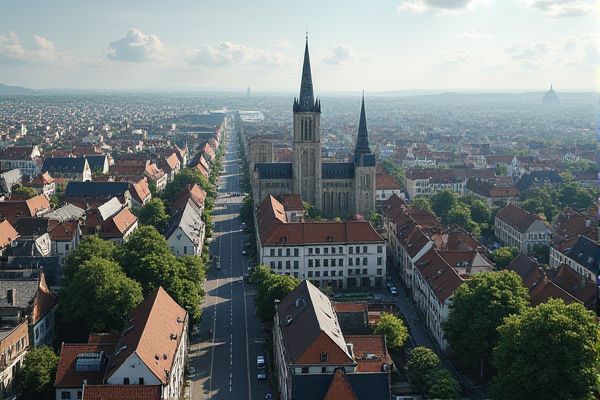
Utilities setup and providers in Belgium: Major electricity providers: Electrabel, Luminus, Engie. Gas suppliers: Fluvius, ORES, Sibelga. Water companies vary by region. Internet providers: Proximus, Telenet, VOO. Energy contracts: fixed or variable rates. Compare utility prices online before choosing. Registration at local commune for setup. Smart meters are becoming standard. Usually, no deposit required for connections. Utility bills often bundled with services.
Major electricity providers: Electrabel, Luminus, Engie.
In Belgium, the major electricity providers include Electrabel, a subsidiary of Engie, which is the largest electricity producer and supplier in Belgium and the Netherlands, operating diverse power stations including nuclear, gas, and renewable energy sources. Luminus, owned by Electricite de France, is the second largest electricity producer and supplier, operating gas-fired power plants, wind farms, and hydroelectric power stations, and also holds stakes in nuclear plants.
Gas suppliers: Fluvius, ORES, Sibelga.
In Belgium, the primary gas suppliers and grid operators are regionally divided: Fluvius operates in Flanders, managing the distribution of natural gas, electricity, and other utilities across all Flemish cities and municipalities. ORES is the main distribution system operator in the region of Wallonia, covering 75% of Walloon municipalities and serving over 1.3 million households. Sibelga, though not detailed in the sources, is known to be the distribution system operator for electricity and gas in the Brussels-Capital Region.
Water companies vary by region.
In Belgium, water services are provided by region-specific companies: De Watergroep in Flanders, Societe Wallonne des Eaux (SWDE) in Wallonia, and Vivaqua in the Brussels-Capital region, with each region having its own set of inter-municipal and municipal utilities. For more detailed information, you can visit the Wikipedia page on Water Supply and Sanitation in Belgium which offers a comprehensive overview of the country's water infrastructure system.
Internet providers: Proximus, Telenet, VOO.
In Belgium, the landscape of high-speed internet is competitive, with several major providers striving to deliver exceptional services to their customers. Proximus stands out by offering ultra-fast and stable internet through its state-of-the-art fiber and 5G networks. With impressive speeds of up to 8.5 Gbps for downloading and 1 Gbps for uploading, Proximus aims to connect at least 70% of homes and businesses to fiber by 2028. Telenet, the largest provider of cable broadband services in Belgium, serves nearly five million customers across Flanders and Brussels, using a two-way digital hybrid fibre-coaxial (HFC) network for its high-speed internet, digital TV, and telephony services. Meanwhile, VOO competes in the market by offering cable broadband, digital TV, and telephony services, primarily in the Brussels region. VOO's offerings, which include various TV packages, add to the dynamic and evolving broadband landscape in the country, raising the standards of connectivity and entertainment.
Energy contracts: fixed or variable rates.
In Belgium, energy contracts can be either fixed or variable. Fixed-rate contracts offer stability with a set price for a specified term, currently seeing a decrease in prices, making them only EUR280 more expensive than variable contracts for a year. Variable contracts, however, can change monthly based on market conditions, and while they can be cheaper, they come with the risk of price fluctuations. For more detailed insights, visit Brussels Times, where recent trends in energy pricing are thoroughly examined.
Compare utility prices online before choosing.
If you're looking to find the cheapest energy suppliers in Belgium, there are tools available online that make this task convenient and efficient. By entering your zip code on certain platforms, you can compare energy prices and find the best supplier that suits your needs. One such tool guarantees the lowest price and ensures an easy switching process. Furthermore, another platform like CallMePower not only allows you to compare all available energy suppliers but also provides crucial information on factors such as price per kWh, contract types, and customer service. This ensures that you can make an informed decision and find the best energy tariff tailored to your needs within minutes, offering a streamlined way to manage your energy expenses in Belgium.
Registration at local commune for setup.
To set up utilities in Belgium, particularly in the Brussels region, there is no requirement to register at the local commune specifically for energy community purposes. Instead, energy communities must register with the energy regulator, Brugel, by submitting an application form and their articles of association, which must comply with specific participative and governance criteria. For more detailed information on how to establish these frameworks, visit the RESCOOP Policy Transposition Tracker page.
Smart meters are becoming standard.
In Belgium, smart meters are becoming a standard, especially for homes powered by solar energy. Fluvius is at the forefront of this movement, planning to install around 403,000 more smart meters by 2025. This initiative will make the use of smart meters mandatory starting January 2025. Impressively, the Belgian grid operator has already installed 553,500 smart meters in Flemish homes equipped with PV systems. Learn more about this initiative on the PV Magazine website.
Usually, no deposit required for connections.
Setting up utilities in Belgium generally does not require a deposit for connections. You can usually arrange for electricity, gas, and water services by providing proof of identity, occupancy, and residence, with the process being relatively straightforward through the supplier's website or by phone. For more comprehensive guidance on this process, visit the Expatica website to ensure a smooth transition when establishing your home utilities.
Utility bills often bundled with services.
In Belgium, utility bills are often bundled with services, allowing consumers to choose a single supplier for both electricity and gas, with many providers offering package deals that can save money. The bills typically include charges for the amount of energy used, the use of the power network, and fees and taxes, all combined into a single payment. To explore more about how utility services work in the country, visit Utilities in Belgium for comprehensive insights and guidelines.
